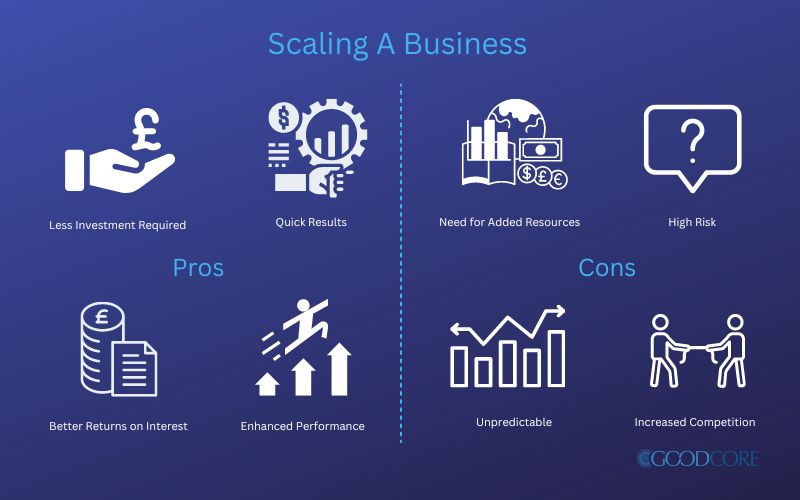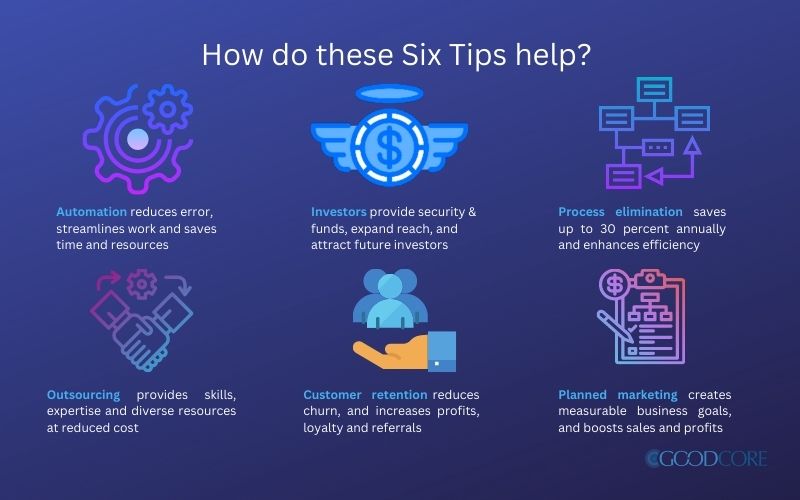How many entrepreneurs who initiate a startup fervently hope for it to stay small forever? Probably none. Most people investing in a business expect it to begin to scale; the sooner, the better. So, what are some typical questions to consider before scaling a business?
- Is staying small better; since it keeps my business agile?
- Would I have to increase my staff, or should I add responsibilities to existing job roles?
- Is collaborating with an investor more lucrative than staying self-funded?
- Should I try to reach new markets or add new products and services? Or should I play safe and perfect my niche?
This blog guides you on how to scale your venture. We will discuss the following.
- What is scaling?
- Ways to Scale a Startup
- Points to consider before scaling
- Challenges to scaling
- Strategies for scaling a startup
Scaling Your Startup
Scaling is a form of growth—in this process, revenue increases without demanding surging investments. To scale your business effectively, you must focus on improving your profit margin/bottom line by increasing revenue while reducing costs.

Ways to Scale A Startup Business
Start-ups work hard to maintain productivity and efficiency. These measures enhance financial results and lower wastage. Scaling companies do not spend extra on acquiring resources, which is why lowered costs result in improved profit margins. An efficient business can reduce production costs by negotiating with suppliers for volume discounts. Read on to learn strategies that can improve efficiency and productivity, such as:
Reduce Costs of Products or Services
If you have already worked on lessening materials costs, consider hiring inexpensive labour. Try to negotiate cost-effective shipping charges. Clinch lowered rent/equipment expenses.
Enhance Product (or Service) Value
Invest the capital saved from reduced costs into enhancing your product or service. You can finance the development of improved or new features or capabilities, increase service levels, or initiate employee training. These improvements promote better pricing and further boost your bottom line.
Create Efficacy in Processes and Procedures
Establishing processes and procedures will help all areas of your business. Automated billing by your accounts team ensures that you send customers bills automatically and apply late payment charges where required. Leaving expenses or reimbursement decisions to employees may create imbalanced or biased decisions. A standardised policy will save valuable time and money.
Automate – Use Productivity Enhancing Technologies
Using technology enhances productivity. The right technology, such as CRM (customer relationship management) software, easily track customer lifecycles and augment marketing and sales efforts. Improved customer services promote a professional, seamless customer experience, which results in a better brand reputation.
Apply Specialization
Do you know that the top reasons for employee burnout are unclear work expectations and ambiguous job roles? Expecting full-time employees to handle serval job roles isn’t always cost-effective. You improve efficiency by hiring specialists and lightening workloads. If you cannot hire full-time specialists, outsource work to get the required expertise at a lower cost. In any situation, the work delivered by experts will always pay for itself because of its accuracy and quality, so don’t disregard the value of knowledge and experience.
Points to consider before scaling
So are you still raring to take the next leap forward after reading the above? Before you do so, ask yourself these questions to see if your startup is ready.
- Does your product or service have a niche market?
- Is your business doing something different from (better than) your competitors?
- Do you have the necessary (existing or readily-available) resources, such as time, technology and manpower?
- Can you sustain the proposed scale-up with enough liquid capital?
- Can you fund the initial expansion and all new technology and personnel requirements?
- Is your current productivity manageable or overwhelming?
- Do you have an automated lead generation system in place?
- Can you acquire other startups?
If the answers to most of the above are honestly encouraging, it’s time to consider your scaling opportunities. Facing challenges, however, is inevitable. Let’s take a look at some of those.
Challenges Faced During Scaling
The will to succeed exerts mounting pressure that can sometimes be detrimental to your existing business. You will face challenges, expect them and preemptively find suitable solutions to work around them.
Lacking Investors
Scaling requires less capital as compared to growth. Find investors to fund your scaling process. Investments at the scaling stage can exceed $100 million, so thoroughly research your options for finding a willing investor.
Insufficient Planning
Scaling (or any business growth) requires foresight, goal setting, and intricate planning. Startups plan short-term goals to measure growth and progress, yet long-term goals sometimes get sidelined.
Establishing goals determines how and when to attract investors, what markets to penetrate, prototype development, hiring requirements and challenges, etc. Long-term planning gives your company the tech direction it needs, so set them judiciously.
Data Mismanagement
As your business grows, so will its operations and data. Manage these effectively by streamlining and automating business processes and data flow. Your best bet is to use software solutions.
Customer relationship management (CRM) systems are a godsend for engaging with and managing your customers. A growing business needs process automation to stay efficient and avoid getting backlogged (or errors) because of manual handling and paperwork.
Micromanaging Employees
Businesses hire employees after assessing their suitability for a job. Monitoring every breath after hiring and onboarding wastes valuable management time and is counter-productive. Your employees might feel demotivated and uncomfortable.
Lapsing Company Culture
You may need new recruitment when you scale. Sustain corporate culture for growing staff though it is arduous, as newcomers may introduce less desirable work habits. A clearly defined company culture helps people align with the mission, vision, and goals and creates a sense of belonging.A positive culture motivates teams, works against stagnation and negates disruptive work habits.
6 Tips for Successfully Scaling a Startup
Scale your startup when you have assessed that your business will be able to efficiently and cost-effectively manage boosted sales, work processes, or output. If your startup can grow without creating new operational issues such as employee turnover from increased workloads, or delays in production caused by increased demand, then scaling will be less stressful if you keep these tips in mind.

1. Reach Out To Investors
Know the strengths of your product or service, understand your target audience, create and establish company culture, hire a reliable team, and achieve sufficient funding.
A company with sound finances attracts the best talent, creates unique sales and marketing techniques, and can diversify.
You can raise funds for your startup by bootstrapping, as seed capital from family and friends, engaging with angel investors, or applying for bank or credit card loans.
Thoroughly research how much capital you would require, your steps after gathering funds, and if you are willing to let investors own shares in your start-up or dictate its operations.
2. Streamline through Automation
A growing business with long-drawn approval cycles, slow communication, or ineffective supply chains predicts business churn. Upgrade tedious manual processes. Read here to learn about Mobile Apps For Business: The Key To Business Growth In 2022.
Automating helps streamline operational processes and keeps your startup’s growth on track. Use versatile, custom-built software options rather than multiple tools with varying functions to save money and time.
3. Reduce Redundancy
Eliminate processes and systems that display low efficacy for your scaled-up business. Automate time-consuming work processes that are done manually but are essential to your business model.
4. Outsource
Outsourcing diminishes costs during scaling. Outsourced, external teams offer cost-effective expertise, save time, and let you focus on revenue-generating tasks.
Remote teams offer valuable resources and technologies that would be costly to implement during scaling and alleviates the burden of micromanagement. Need help Selecting IT Outsourcing Companies: Eastern Europe Or Asia? Read here.
5. Prioritize customer retention
Startups concentrate on customer acquisition, lead generation, and sales funnels. Shift your focus on customer retention when scaling up. A retained customer trusts your brand, makes repeat purchases, and willingly pays more than new customers.
Offer a dynamic customer service experience. Engage with your customers, take their feedback and suggestions seriously and make regular improvements.
6. Plan Marketing
Integrate a substantial marketing budget into your business plan. Landing new customers is a result of marketing success. Marketing also adds to customer satisfaction and brand loyalty.
Conclusion
Business goals and expectations aspire towards both growth and scaling. Both produce success. Scaling channels your business vision and increases its impact. Business growth offers predictable, steady revenue.
Yes, scaling is more attractive because it works faster, is cheaper, and yields higher results. Alternatively, growth is less risky, offers predictable results, and is excellent when your goal is gradual expansion.
Adopt focused strategies, software, and plans to promote scaling. Hire wisely, and outsource everything irrelevant to core competencies. Business automation and streamlined internal processes counter the challenges of scaling. Good Luck!





